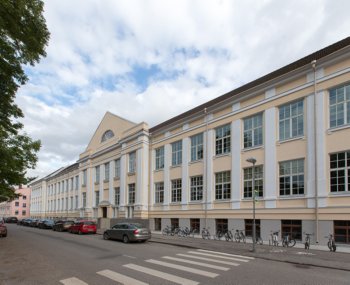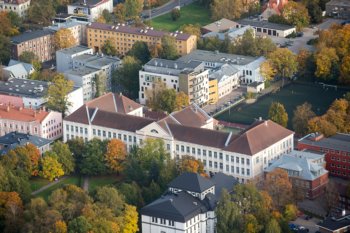University of Tartu

ABOUT THE UNIVERSITY
As Estonia's national university, UT stresses the importance of international cooperation and partnerships with reputable research universities all over the world. The robust research potential of the university is evidenced by the fact that the University of Tartu has been invited to join the Coimbra Group, a prestigious club of renowned research universities.
UT includes four faculties. To support and develop the professional competence of its students and academic staff, the university has entered into bilateral co-operation agreements with 79 partner institutions in 31 countries.
The University of Tartu was founded in 1632 by the Swedish king Gustavus Adolphus. It was initially called Academia Dorpatensis. The necessary preparations for creating a university in Tartu (then Dorpat) were made by Johan Skytte, governor-general of Livonia.
The Department of Geography
The Department of Geography, University of Tartu, (head of department Evelyn Uuemaa) belongs to the Institute of Ecology and Earth Sciences of the Faculty of Science and Technology. The department includes three chairs:
- geoinformatics and cartography;
- human geography and regional planning;
- physical geography and landscape ecology.
The Chair of Geoinformatics and Cartography provides education and carries out research in geomatics, geoinformatics, cartography as well as remote sensing, geodesy and topography. The head of the chair is Prof. Tõnu Oja.
The chair of human geography and regional planning provides education in spatial aspects of the functioning of human society, in a particular population, culture and mobility, the structure of different regions of the world, problems of economy and politics, and regional policy and planning in Estonia and the neighbouring regions. The head of the chair is Prof. Tiit Tammaru.
The chair of physical geography and landscape ecology teaches disciplines of traditional physical geography and fast-developing aspects of landscape changes and analysis. The head of the chair is Prof. Ülo Mander.
TARTU AND CAMPUS

As a student of the University of Tartu, you will quickly lose your heart to the city. Tartu is famous for its cosy historic campus area intertwined with the city centre and parks. Many sporting facilities, a green corridor along the River Emajõgi, and good quality cycling routes help to keep students physically active. In addition, Tartu is a compact city where everything you need is within walking distance.
Tartu does not provide only physical, but also digital proximity to all the places and services you need! Public or university-related WiFi connections enable you to access the Internet almost everywhere in the city. For example, you can easily chat with your family and friends back home over smartphone apps everywhere in the town. Estonia is well known for its technological development, digital services and platforms that make everyday life comfortable and time use efficiently.
As a student you will spend most of your study time in the historic study building at Vanemuise street 46, located in the central city, a 15-minutes walk away from Town Hall Square. The building hosts the Department of Geography, the Department of Zoology, the Dean’s Office of the Faculty of Science and Technology, and the Natural History Museum. The museum affiliates zoological, botanical, mycological and geological collections and opened a new permanent exhibition ‘Earth.Life.Story’ in 2016. Access to the museum is free of charge for the students.
The study building includes free usage of the computer lab for our students. Computers are equipped with spatial analysis software and enable the fulfilment of all assignments required during the studies. During your spare time at the study building, you are welcome to use the cosy coffee-room of the Department of Geography.

